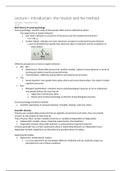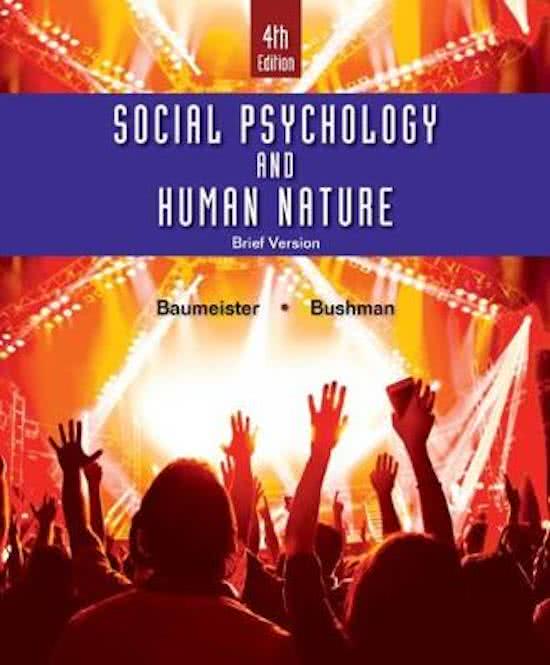Lecture I: Introduction: the mission and the method
Saturday, 7 November 2020
15:02
Brief history of social psychology
Social psychology: scientific study of how people affect and are affected by others
Two approaches to explain behavior:
Kurt Lewin: behavior is a function of the person and the situation/environment
B = f(P, E)
Gordon Allport: attitudes are most important concepts to understand human behavior
Sum of all beliefs that people have about an object or behavior and the evaluation of
those beliefs
Different perspectives on how to explain behavior:
50's - 60's:
Behaviorism: Observable actions that could be studied. Explains human behavior in terms of
learning principles (rewards and punishments)
Psychoanalysis: elaborate interpretations and experiences of events
70's:
Social cognition: how people think about others and social relationships. The study of simple
cognitive processes.
90's:
Biological explanations: evolution theory and physiological measures to try to understand
why people behave the way they do
Apply basic evolutionary ideas
Recent work involves physiology as element of psychological processes
Social psychology combines methods
Scientific approaches to measure behavior, thoughts, feelings, and inner states
Scientific theories
Theories are unobservable constructs that are logically connected to each other, they can provide
answers to why people do what they do.
These theories often contain multiple constructs or variables (independent of dependent);
Independent variable: values created by experimenter (manipulation)
Dependent variable: observable behavior or questionnaire response (measure)
A theory generally has a certain expectation about a relationship between an independent and a
dependent variable: hypothesis (an idea about the possible nature of reality).
Experimental studies
Experiment: manipulate & random
In a true experiment we manipulate different conditions and we randomly assign our
participants to one of these conditions
, Quasi-experiment: not random
In a quasi-experiment we also have manipulation but participants cannot be randomly
assigned to one of the conditions
Field experiment: real-world
In a field experiment we try to collect our data in a real-world environment.
Research design
Experimental designs
Within-subject: all conditions
In which participants experiences all the levels of the independent variables
Between-subject: one condition
In which a participant experiences only one level of the independent variables
Non-experimental
correlational: relationship
In which we investigate a relationship between two or more variables
Meta-analysis
Where we combine the statistics of published results on a specific concept
Survey research
Where we ask people to fill in a questionnaire
Validity: whether you actually measure the construct that you aim to measure
Reliability: whether you get the same result when measure the same concept multiple times
Both concepts together are important for us to generalize the result we find in our studies
Quantitative research is expressed in numbers and graphs. It is used to test or confirm theories and
assumptions. This type of research can be used to establish generalizable facts about a topic.
Qualitative research is expressed in words. It is used to understand concepts, thoughts or experiences.
This type of research enables you to gather in-depth insights on topics that are not well understood.
Reproducibility crisis
Thousands of studies performed every year
A great deal is being learned and progress is made
Controversies create impression of chaos and anarchy
Self-correcting nature of science
Replication: repeating studies can correct false theories
Falsification: trying to come up with arguments why your theory is not correct
If you cannot come up with some, you have a good theory
Reliance on student samples
Don't worry about correctness, but about generalizability
Cultural relatively
Western cultures dominate research
Cultural differences may be substantial and important
,From lecture
Social psychology: Scientific study of ways in which people's behavior and mental processes are shaped
by the real or imagined presence of others
Aim to get a broader understanding (ABC-
Affect
Behavior
Cognition
Late 1800s: two experiments with opposite findings
Norman Triplett's competition machine: the mere presence of others enhances performance
Max Ringelmanns's rope pulling experiment: as group size increases, individual effort decreases
, Lecture II: Culture and Nature
Saturday, 7 November 2020
16:03
Social psychology is aimed at exploring how people think, act, and feel. The ultimate explanations for
human behavior lie in nature and culture, and researchers have engaged in many long, bitter debates
over which of those is more important.
Nature and social behavior
Explaining the psyche
Psyche is a broader term for mind, encompassing emotions, desires, perceptions, and indeed all
psychological processes. To understand something, you have to know what it was designed to do.
Nature explanation: people are born in a certain way; their genes, hormones, brain structure, and other
processes dictate how they will choose and act.
Cultural explanation: focus on what people learn from their parents, from society, and from their own
experiences.
Views
Nature comes first, and culture builds on what nature has furnished.
This book: nature and culture have shaped each other. In particular, nature has prepared human
beings specifically for culture.
It depends on what?
An explanation of behavior is either nature, or a combination of nature and culture
Nature and culture have shaped each other
This is key to understand how people think, act, and feel
Nature defined
Nature: physical world around us, including all of its laws and processes. It includes the entire world that
would be there even if no human being existed.
Nature states that people are born in a certain way and there are many different theories that are
used by people within nature that can explain human behavior
Evolution, and doing what's natural
The theory of evolution focuses on how change occurs in nature.
Traits of living things
The drive to prolong life.
o Living; death has always been a disturbing threat, and beliefs that death is not the end but
merely a transition into a different kind of life have been found all over the earth since
prehistoric times.
o Reproduction; life makes new life. You might say that nature was unable to create an
immortal being and therefore settled on reproduction as the only viable strategy to enable
any form of life to continue in the future.
Change; each living thing changes as it grows older, but more important forms of change occur
from one generation to the next: Children are different from their parents.






